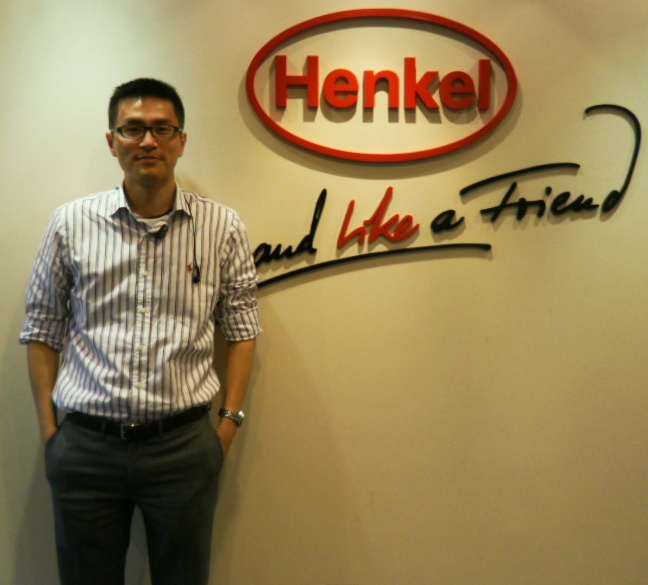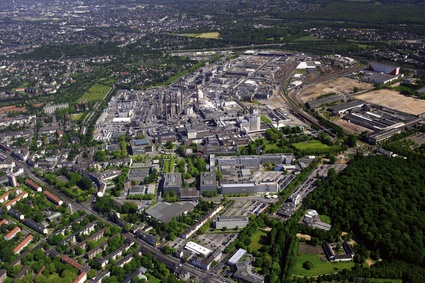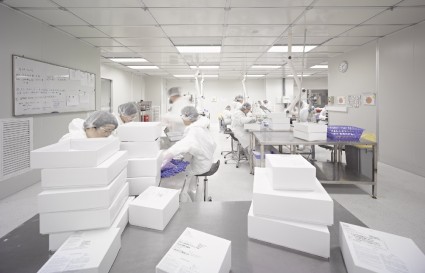LED Industry Has Entered the Mass Production Stage but How to Reduce Cost and Improve Quality?
LEDinside conducted an interview with Kent Lu, the Regional Marketing Manager of Henkel Asia Pacific. With abundant experiences in the Asian Market and the industrial material industry under his belt, Mr. Lu was able to shed light on the development of the LED adhesive market and analyze how manufacturers redefine their LED lighting products, optimize the manufacturing process, and reduce the total cost with adhesives of various levels and traits.

Kent Lu, the Regional Marketing Manager of Henkel Asia Pacific.
A Representative Supplier of Industrial Materials and Adhesives
The number of employees of Henkel, founded by Fritz Henkel in 1876 with 135 years of history in the making, increased from 80 to almost 50,000 currently. The yearly revenue of Henkel, one of the top 500 companies in the world, reached 15.09 Euros in 2010, is a global company with most of its employees located outside of Germany. Henkel’s key manufactures include cleaners, cosmetics, and adhesives.
Its product lineup covers both consumer and industrial applications. Recently, Henkel has been aggressively developing adhesives for LED potting, encapsulating, and filling.

Henkel - Headquarters Düsseldorf, Germany.
In regard to the adhesives the LED industry requires, Henkel mainly provides die attach adhesives and sealants for LED light products and adhesives for LED packages. Due to its great deal of experience in the adhesive market and many patents regarding adhesive technologies, Henkel possesses advanced knowledge and rich resources in terms of customized products and technology support. Henkel’s sales team and R&D team are located around the globe, so they are able to create a better communication with their clients and solve the problems occurring during the manufacturing process together. In addition, they can customize clients’ products according to their needs and provide advice for improvement, helping their clients achieve cost reductions.
Presently, Henkel provides sealants and adhesives for LED chip package, conductive materials and LED light products and thermal adhesive, thermal pad for LED thermal dissipation. Moreover, Henkel supplies innovative phase-change material products which are compatible with the high-power LED light products.
Lu stated that as the LED industry develops and matures, the expanding market requires larger capacity. Therefore, thermal dissipation and the enhancement of LED encapsulation become more crucial. Henkel’s expertise helps manufactures produce LED light products with higher stability and lower costs.
From Henkel’s perspective, different LED lights and backlight products are compatible with different adhesives. There is no single adhesive that can be adopted universally in every application. For instance, silicone is not suitable for certain applications despite its excellent leak-proofness. Taking such a variable and cost reduction into account, Henkel discusses with its clients to determine the most compatible adhesive for their products.
High-Quality Adhesives Enhance LED Lighting Products
Lu continued to use LED adhesives as an example to demonstrate the help they can bring to the manufacturers. For those who produce low-power or interior lighting products, the quality of thermal dissipation does not make a major difference, as their products do not depend heavily on thermal dissipation. Some manufacturers would simply adopt dry joints, so it is hard for them to understand the benefits of high-quality thermal adhesives. Interior lighting products and LED street lamps require different thermal solutions. For example, an adhesive with high coefficient of heat conductivity is suitable for interior lighting applications. Since the products do not require much adhesive, the cost of adhesive is relatively small in proportion to the total cost. On the other hand, it will be a bad choice to adopt the same adhesive in LED lamps as they require a great amount of adhesive, which will result in a considerable cost.
Some manufacturers keep promoting thermal solutions with existing thermal pads and tapes, but they cannot be adopted in certain situations. What distinguishes Henkel from its competitors lies in its ability to provide its clients with adequate suggestions and customize products according to their specific demands instead of selling them its finished products. Henkel supplies a wide variety of adhesive products, which allow it to truly cater to the needs of different clients.
Lu also analyzed the adhesives for LED packages. He pointed out the majority of LED package makers used to adopt epoxy resin, but recently silicone has become another mainstream choice. The former is highly compatible but will inevitably turn yellow over time; the latter is immune to the color-changing issue and is good for an extended time of use. However, it has a tendency to be penetrated by small molecules that cause residues, which will compromise the luminous flux of LED. Such an issue will not occur in LED packages adopting epoxy resin.
Henkel’s die attach adhesive holds a large market share in the LED package industry, and Henkel is striving to make a break into the potting adhesive market.
In regard to the bonding and encapsulation in LED product structures, the potting and protection of various products such as driver IC and light bar, and the component protection in low-temperature and low-pressure molding process, Henkel has launched assorted related solutions.

Henkel’s fab and production line in China
Cost Reduction Achieved by Improved and Simplified Manufacturing Process
Furthermore, Lu indicated that when a manufacturer plans to carry out a LED light bulb project, the selection of adhesive to adopt is usually one of the primary issues to be considered, and the decision is always budgetary. To further his point, Lu indicated the limitations cheap adhesives bring to the product design. He stated that due to the low tack of cheap adhesives, manufacturers need to add a buckle to the shell and base of the light bulb in order to prevent the shell from falling off. Based on Henkel’s experience, the buckle design will result in an even higher cost than purchasing high-quality adhesives in the first place. On the other hand, manufacturers would not need to worry about the light bulb shells falling off due to high temperature or other factors if they adopt Henkel’s high-quality adhesives with high tack. Such a decision in the manufacturing process will effectively lower the total cost and in turn increase profit.
In addition, he used another example to illustrate the criticality adhesives hold to the mass production of LED light bulbs. He pointed out that before the expansion of the LED market, the capacity of a small manufacturer was about 3 thousand light bulbs per months. Due to the relatively small capacity, extra time was allowed for the cheap adhesives to cool down and the bonding process to complete. However, as the market expands, hypothetically, if the capacity increased to 30 thousand light bulbs per month, extra time will not be allowed due to the tight shipment schedules. It raises a question: what are the solutions to such an issue?
First, it can be resolved by adopting adhesives which require much less time to cool down. Second, adopting UV curing equipment to accelerate the bonding process can also solve the issue, but this method is more suitable for LED light product makers with large capacities. Third, adopting two kinds of adhesives to speed up the bonding is another way to go.
Lu indicated that no matter what kind of method the manufacturers choose, Henkel is able to provide the most suitable adhesive. In addition, Henkel will provide their professional insights and help the manufacturers establish the most proper production scale and budget.
State of LED Adhesive Market
Henkel has sought joint effort with many LED manufacturers, mostly in China, Taiwan, South Korea, and Japan. Lu stressed that Henkel has successfully expanded its business to the Chinese and South Korean markets, where manufacturers have been endeavoring to establish their own brands globally. On the other hand, there are few Taiwanese vendors as the majority of Taiwanese manufacturers focus on ODM products, whose quality has been hugely acknowledged by the global market. As for the Chinese manufacturers, they are underpinned by the huge adhesive demands from the domestic and global markets.
Lu claimed that in mature markets of Europe and America, manufacturers’ choices of adhesives are based on not only stability and endurance, but also on the total cost. He expected the Asian market to follow the same path. Henkel has its own R&D center and professional technicians located in countries around the globe. It enables Henkel to provide clients with immediate technology support and solve the difficulties they encounter when purchasing and using Henkel’s products.
Moreover, on account of its huge capacity, Henkel’s key products are always ready for shipment. As for customized products, extra time is required as the elements need to be adjusted. Valuing the prospects of the Asian market greatly, Henkel hopes to help Asian clients manufacture products with higher stability, better thermal dissipation, and lower cost.
Henkel owns brands such as Ablestik, Emerson, Cuming, Hysol, and Loctite in the LED market, providing the industry with total solutions for LED packages and the assembly of light products.
By Lowy Chang





 CN
TW
EN
CN
TW
EN







